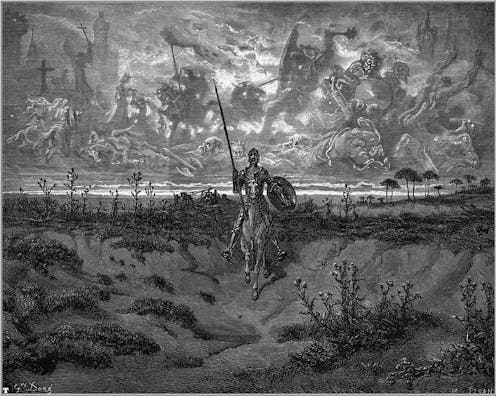Books
Spain Found 'Don Quixote' Writer Cervantes' Tomb

Miguel de Cervantes has been called the father of the modern novel for his 1605 and 1615 two-volume book The Ingenious Gentleman Don Quixote of La Mancha, by all accounts one of the greatest fiction stories ever published. But a great tragedy in literature is that Madrid-born Cervantes died in poverty just one year after the second volume of his magnum opus was published — incidentally on the same exact date as fellow literary titan William Shakespeare, though the two used different calendars. But this week, Spain announced that its team of researchers uncovered what they believe to be Cervantes' tomb, 399 years, just one month short of 400 years on the nose, since his death.
Cervantes was buried with his wife in Madrid's Convent of the Barefoot Trinitarians. However, when the convent was rebuilt around 1673, his bones were lost. Last year, Spain took up the search to find Cervantes' missing tomb, hoping that with his remains they'd be able to digitally reconstruct what his face looked like and find out how he died.
And now researchers believe they've found it. According to the BBC, forensic anthropologist Francisco Etxebarria reported that his team of 30 researchers identified "some fragments" of the Don Quixote writer using infrared cameras, 3-D scanners, and "ground-penetrating radar." Adult bones surrounding these fragments reportedly match Cervantes' wife and others he's believed to be buried alongside. Further DNA analysis is planned to separate Cervantes' bones from the others.
However, thus far the goals of reconstructing a picture of what his face looked like and possibly determining a cause of death seem far off.
"The remains are in a bad state of conservation and do not allow us to do an individual identification of Miguel de Cervantes," forensic scientist Almudena Garcia Rubio told the BBC. "But we are sure what the historical sources say is the burial of Miguel de Cervantes and the other people buried with him is what we have found."
Modern doctors and scientists have alleged that Cervantes likely died of type two diabetes, caused from cirrhosis of the liver. However, rumors of the writer's alcoholism don't seem to match up with his writing productivity late in life, historian Fernando Prado told The Guardian.
Cervantes' Don Quixote follows the adventures of a Spanish nobleman who loses his mind and sets off to bring back the art of chivalry. He calls himself Don Quixote, and he brings along the farmer Sancho Panza as his squire.
Images: Holger Thölking, The Yorck Project, Escarlati/Wikimedia Commons